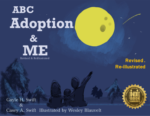Feeling short of time or finding it difficult to concentrate? You can listen to this post. Listening time: 10:17

Lessons from 2020
The past year taught us we must learn to discuss hard things, listen to multiple voices with respect, and complete attention. We must strive to understand all sides of the conversation. Adoption is no different. People have very strong feelings about it.
Who are the experts?
Is it therapists, social workers, adoptive parents? While each has a degree of expertise, they also tend to have a particular point of view that reflects their role in adoption. Their roles form the lenses through which they experience and interpret adoption. The real experts are adult adoptees. Parents, adoptive siblings and birth siblings, extended family, and adoption professionals are all secondary voices.
Typically, adoptive parents have the most enthusiastic voice in any conversation about adoption. Professionals form the next tier. The main cultural belief holds adoption as a totally benign win/win solution in which all participants land on their feet with a smile on their faces and gratitude in their hearts.
The reality of adoption is more nuanced.
Adoption Attunement affirms a more nuanced concept that sets aside the fairytale and validates the grief and loss in which all adoptions are rooted. It recognizes that before the adopted family comes together, the birth family is fractured. When speaking about adoption we must not lose sight of that painful reality.
As parents, we have an understandably positive bias about adoption. After all, it brought our children into our families and our hearts. Adoption made our parenting dreams come true. So, to us, adoption feels positive, awesome, in fact. We willingly take the stage and speak of the blessings of adoption. Our impassioned voices dominate the conversation.
But what about our children? Who hears their voices?
Who listens to their perspective? Who witnesses their losses as well as their gains? Who acknowledges that they had to lose their birth families before they could join our families? Who affirms their need to know about and connect to their birth families and their roots? Too often, our culture dismisses or minimizes this need. In many cases, adoptees are vilified for pursuing their natural human need to know about their roots.
When we do listen, are we listening with empathy, open minds, and hearts?
Or when we listen, are we listening through the filter of our positive bias? Is our body language sending a subtle– or not so subtle– message that we want to hear our children “accent the positive” when they discuss adoption. Have we telegraphed a silent message to our children that we are uncomfortable or unwilling to hear about the darker thoughts and feelings that adoption might elicit? Is this our Pandora’s box that we secretly want to keep padlocked?
Who is hurting?
Parents suffer when we see our kids in pain whether it is physical or emotional. We leap to comfort them and to cure the cause of their distress as quickly as possible. While our eagerness is primarily motivated by genuine concern for them, part of us is also eager to relieve our own discomfort. But sometimes the only way to handle tough stuff is to face it not to stuff it under the rug or to slap on a Band-Aid of positivity and denial. Be “with” them as they work through their discomfort. Lift their voices. Encourage them to speak their truth– their whole truth. Listen as an act of love.
Accept the reality that in adoption, grief and loss coexist with the gains and blessings. Adoption creates a world of Both/And. It does not erase the presence or influence of the birth family. That remains mind, heart, and body.
How do we help our children use their voices?
Start when they are young. It need not be a Big Deal conversation along the lines of, I think we should talk about how you feel about being adopted. We all know how it feels when someone approaches us and says, We need to talk. Our stomach drops, hearts pound, and thoughts race. Our whole being is on the alert. This is not exactly the best scenario for a heart-to-heart convo with our children. A direct invitation like Want to talk about adoption? is likely to be unwelcome and rebuffed.
Instead, learn how to routinely drop “seeds” in your everyday conversations.
- Wow, you are so… I wonder if that talent runs in your birth family? (Fill in the blank with the appropriate talent or quality.)
- Your birth mom would be so proud of you.
- I bet (Name) thinks of you in a special way on your birthday.
If your child wants to pursue the conversation, follow their lead. If not, just leave the question to linger in their minds. If you do it frequently and with genuine curiosity, the kids will feel that when they are ready, you will be receptive to talking about adoption. That’s the first step.
Avoid these surefire ways to get children to “clam up”.
Minimizing
Dismissing
Making excuses
Rationalizing the behavior, conversation, and attitudes of others.
Denying or invalidating their experience.
Jumping to Fix It mode
Shutting down any “negative” thoughts about adoption
Being blind to their adoption-connected grief and loss
Appearing sad, hurt, overwhelmed, or angry when they share
Expecting 100% of their “loyalty”
None of these responses leave space for empathy, affirmation, or curiosity about how they are feeling, or what ideas they have on how to handle the issue at hand. Attune. Attune. Attune. Validate their experience. Thank them for trusting you enough to share. Ask them what they would like you to do. Allow them to take the lead while reaffirming your willingness to assist, if necessary.
Initiating Difficult conversations is a skill that takes practice
Start when they are young. How? Books are a superb way of raising conversations about adoption. With them snuggled beside us sharing the same book, we create moments of “togetherness” that go beyond the words and the physical closeness. It creates a moment of intimacy, of shared interest, and focused attention. Kids need that.
Be sure your family library includes books that reflect the total adoption experience, not exclusively the positives. (Think of how you feel when people dismiss or minimize the challenges you’ve experienced like miscarriage, infertility, or the death of a child.)
Start Early
 As always, it is important that you provide your children with truthful, age-appropriate information even in your very earliest conversations when they are very young. This way you can add information and provide detail and context as they are mature enough to learn it. For example, the picture book ABC, Adoption & Me uses the simple alphabet format to introduce adoptees to many complex aspects of adoption in a way that is appropriate even for very young children. The format is one with which they are familiar and comfortable so it provides an easy framework on which to build.
As always, it is important that you provide your children with truthful, age-appropriate information even in your very earliest conversations when they are very young. This way you can add information and provide detail and context as they are mature enough to learn it. For example, the picture book ABC, Adoption & Me uses the simple alphabet format to introduce adoptees to many complex aspects of adoption in a way that is appropriate even for very young children. The format is one with which they are familiar and comfortable so it provides an easy framework on which to build.
The letter A page says A is for adoption. Some families come together through adoption. Mine did. Seems pretty simple. And yet… inherent in the statement is that adoption is not the norm, something the child will eventually have to come to grips with: most people raise the children to whom they gave birth.
The groundwork is laid for exploring the causes of adoption and eventually your child’s specific circumstances when they are older.
No spoiler alert needed: the book continues with the letter B. B is for bellybuttons and birthdays. Everyone has them. Again, seems very obvious, basic. And… it begins a path to why we all have bellybuttons: we all grew inside our mothers. We were born on a particular date. For adoptees, this day predates the time they joined our adoptive families. You can readily see how the conversation can expand to suit a child’s maturation and curiosity.
How are you making sure your children know that you want to hear their voice?
What books are on your family shelf? Do they reflect a balanced perspective about the gains and losses of adoption? How well do they lift up both the parental experience and the child’s?
Photo credit: https://creativecommons.org/licenses/by-nc-nd/3.0/
__________________________
- Call us at 1-800-653-9445
- Listen to our podcasts: Adoption Matters: Real People. Real Life. Real Talk and Essentials of Adoption Attuned Parenting
- Watch our YouTube channel
- Read Books written by our coaches
- Click to learn more about Adoption Attuned Certified coaching!


